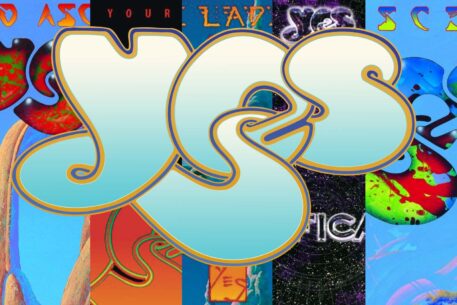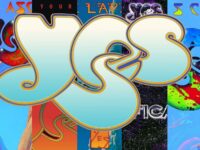John M. Gouldin is breaking down five less-heralded albums Yes released between 1996-2001 in a multi-part series, beginning with ‘Keys to Ascension’ and concluding now with 2001’s ‘Maginification’:

Since Yes debuted in 1968, it has been acclaimed, called a dinosaur, prospered and been declared dead a few times. They survived all of it, leaving behind a long discography of almost always interesting and sometimes remarkable music.
One particular span stands out for having produced five albums of unusually variegated music, even for a band known for changes, in six short years. The background story that caused these recordings is a matter of decisions, chance and circumstance. As the band reacted, new music testified to its resilience.
The Ladder, released in 1999, seemed to answer lingering questions of career path and style, utilizing the same prog, pop and rock genres as immediately prior, but restyling them in an energized manner capable of setting Yes back onto a clear determined path after the buffeting of the previous couple years.
Despite this, significant decisions were made in spring 2000 to move on without newest member Billy Sherwood and to embark on a summer tour showcasing only elite Yes chestnuts from their extensive vault with nothing from the immediate past.
Down to five, the Masterworks Tour was a month old in July 2000 when Yes traveled to Washington, D.C. There, in an apex moment in YesHistory – this one unforeseeable – recent addition and valued keyboardist Igor Khoroshev tried to touch the wrong female security guard in the wrong manner while backstage, finding himself arrested and booked.
While other groups positively sell records off such incidents, Yes has past examples of being as uptight as a Vatican brothel, and was not going to be tolerant. Khoroshev finished the remaining tour dates and quietly left the band, now holding a place as a lesser-known alumni despite building a strong reputation in his short time.
It must have been depressing. The second of two rebuilding efforts lay burning in a heap, both leaving significant music. A keyboardist was necessary for any catalog music. The future was again insecure. Squire, White, Anderson and Howe chose to remain a foursome and embark on what today looks a lot like a pact of honorable ritual suicide.
Choosing the most unexpected and least commercial of all possible roads, they went into a California studio in early 2001 to begin work with a symphony. It was a risky proposition anytime, and especially in a year when Linkin Park’s Hybrid Theory would be the best-selling album. As the band worked, another Yes irony unfolded when the studio cuts from the Keys to Ascension debacle were assembled and unceremoniously dropped into availability in May as a sort of too-little too-late, told-you-so raspberry for all concerned. Keystudio is an album known only to hard-core fans.
Presented in this context, the indiscipline regarding the music’s first exposure is again validated. All songs shine brighter, parented by the two biggies protecting the whole in a package that feels a bit stately, even with the chintzy cover. Fantasizing Keystudio as just another Yes release and not a compendium, it rises considerably in grading and immediately fits somewhere above midway in quality rankings of their discography.
‘MAGNIFICATION’
Released: September 2001
Players: Jon Anderson, Alan White, Steve Howe, Chris Squire
Producer: Yes and Tim Weidner
The only connection between this recording and the last are the personnel. A wrenching shift attended by only the most indulgent of Yes fans, its attributes clearly outweigh defects as the selection of songs – albeit generally weaker this time – display a deft ability to control a noticeably mature emotional ebb and flow that is very appropriate to this undertaking.
Magnification is AOR symphonic prog and pop built by people with a familiarity of variable time signatures, yet good ears for melody. The relaxed, open construction serves as a prog ID for the quasi-classic, reverential “In the Presence of,” but in a style attuned to the moment and fairly aloof from The Ladder or the regenerative Keys to Ascension.
American composer/conductor Larry Groupe wrote the orchestrations and gets part credit for avoiding symphonic rock cliches of merely overlaying or serving as a keyboard replacement. Integration sounds plainly easy (though Steve Howe called it “tricky” to get right) and helps verify a long-held fan suspicion that Yes has always been the most obvious organization on the planet to work with a symphony.
The longer songs are superior and control the mood of mild elegance which permeates, whether demonstrative or restrained. The title cut and “Give Love Each Day” are voluptuous and more reliant on the symphony to make their points, while Howe’s refined “We Agree” holds back power for crescendo embellishment, but all seem part of one crafted pulse.
Shorter songs are generally weaker but serve as needed varietal palate cleansers. Sacrificial promo “Don’t Go” shows that, by now, Yes held command over writing catchy pop tunes. The incipient Jon Anderson blip “Soft as a Dove,” however, is merely a place holder preparing the listener for the complexities of big, plush “Dreamtime.”
Magnification was fronted by a very Yessy concept and graphics by Bob Cesca, packaged with an extra disc of live material, and supported by a two-month orchestral tour (jubilantly captured on the Yes Symphonic video), but nothing grabbed public interest. This was the third major shift in six years. Whether from shedding confused fans or creating a record with little market or demographic, sales figures bottomed out with this derivation.
Sales, however, do not equate to quality. Magnification is undeserving of the distinction as the band’s lowest-selling studio record, and stands on its own merits. Listening today to both The Ladder and Magnification reveals Yes in one of those occasional and audible high creative periods that dot the history of a long-lived band. Whatever the circumstances of creation, good music endures repeated appraisal.
Though it might have been foreseen, the ignominious sales of Magnification had an effect. Rick Wakeman returned to the fold in early 2002 for a fifth visit and the classic lineup would tour steadily for a couple years, but there was no studio music for the rest of the decade.
This drought ended with 2011’s well-regarded Fly From Here. The late-period lineup of guitarist Steve Howe, bassist Billy Sherwood, keyboardist Geoff Downes, vocalist Jon Davison, and drummer Jay Schellen then released The Quest in 2021, with the promise of more to come.
Taking into account a legacy where few aspects ever operated entirely smoothly, the 1996-to-2001 era was an especially agitated time which nonetheless stubbornly brought forth a string of individualistic albums that displayed a different approach, musicianship, sound and appeal in quick succession. The culmination of this craggy, fertile period was new ground broken with the unique and gravitational Magnification, still a one-off bright spot in their canon despite its lack of market competitiveness in 2001.
In six years, Yes made five albums of rock, pop and orchestral, with what are essentially three styles of progressive music interspersed. That is a lot of ground to cover. A few of these songs have become ‘Yes classics’ but a greater number qualify as just good music – and still worthy of a listener’s time.
Click here for John M. Gouldin’s four-part series on one of Yes’ most overlooked eras, with thoughts on ‘Keys to Ascension and Keys to Ascension 2,’ ‘Open Your Eyes,’ ‘The Ladder’ and ‘Magnification.’
- The Story of the Only Yes EP: ‘From a Page’ - August 18, 2023
- New Yes History: A Moment to Breathe, A Moment to Listen - May 15, 2023
- Returning to One of Yes’ Most Overlooked Eras: ‘Magnification’ - February 13, 2023


